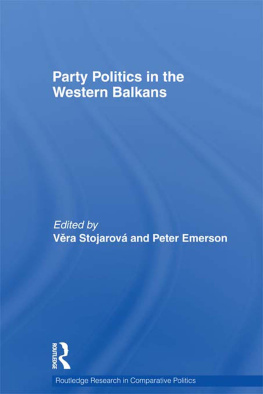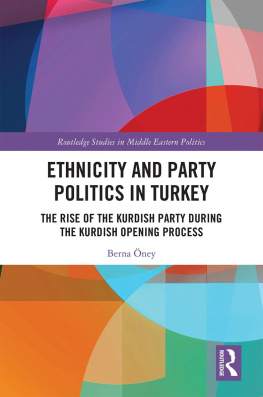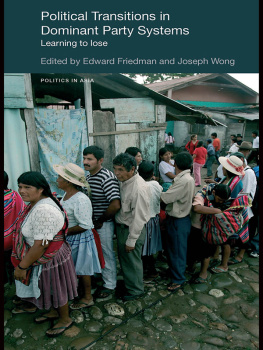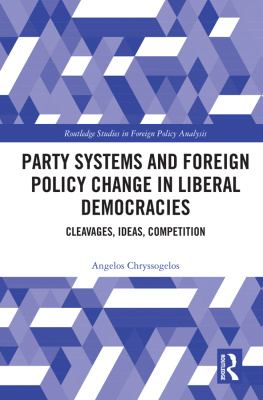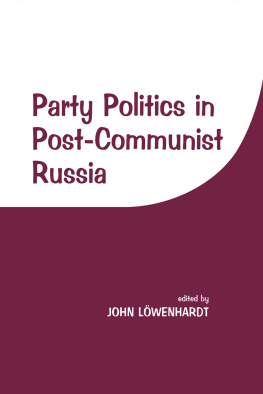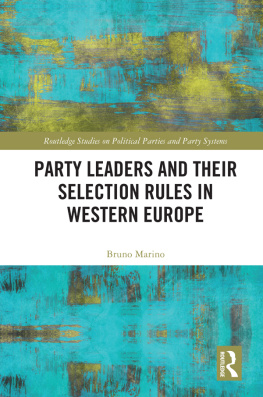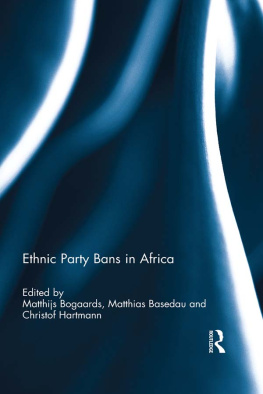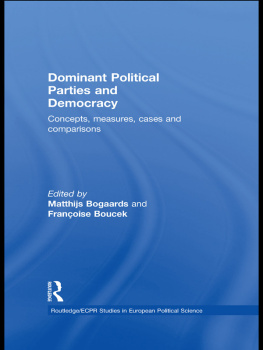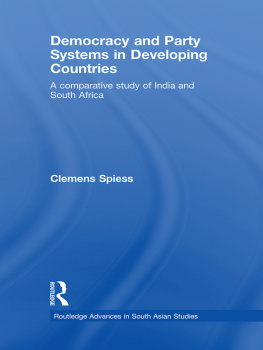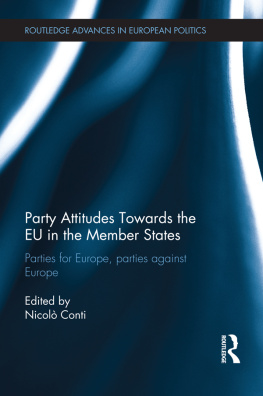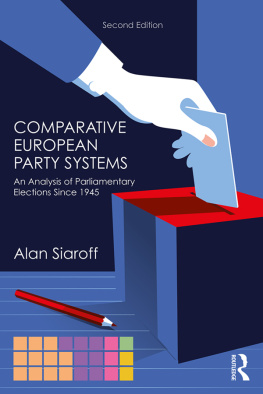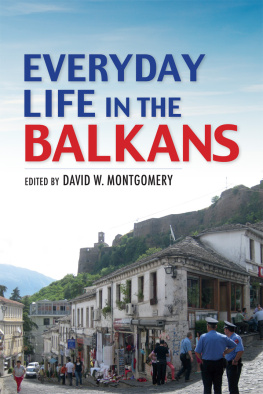This book examines the development of party politics in the region of Western Balkans, describing party politics and analysing inter-ethnic or inter-party cooperation and competition.
Beginning with a thematic overview of the electoral systems and their link to the party systems, the authors consider the legacy of socialist/communist parties; compare the nationalist parties in the region; and explore opportunities for the national minorities. The book then provides detailed country case studies on Croatia, Bosnia and Herzegovina, Serbia, Montenegro, Kosovo, Macedonia and Albania that:
provide an overview of the development of the respective political system since 1990, presenting key changes over time;
depict important political issues in each of these countries and explain parties particular policies in relation to these issues;
explore the extent to which nationalism has dominated party organisation, the stability of the parties, important changes in the party policies, and their electoral performance and personalisation of the parties.
Bringing together a range of specialist experts on the Balkans, this book will be of interest to students and scholars of party politics, comparative European politics, post-communist politics, nationalism, Southern European and Western Balkan politics.
Routledge research in comparative politics
1 Democracy and Post-communism
Political change in the post-communist world
Graeme Gill
2 Sub-state Nationalism
A comparative analysis of institutional design
Edited by Helena Catt and Michael Murphy
3 Reward for High Public Office
Asian and Pacific Rim States
Edited by Christopher Hood and B. Guy Peters
4 Social Democracy and Labour Market Policy
Developments in Britain and Germany
Knut Roder
5 Democratic Revolutions
Asia and Eastern Europe
Mark R. Thompson
6 Democratization
A comparative analysis of 170 countries
Tatu Vanhanen
7 Determinants of the Death Penalty
A comparative study of the world
Carsten Anckar
8 How Political Parties Respond to Voters
Interest aggregation revisited
Edited by Kay Lawson and Thomas Poguntke
9 Women, Quotas and Politics
Edited by Drude Dahlerup
10 Citizenship and Ethnic Conflict
Challenging the nation-state
Haldun Glalp
11 The Politics of Women's Interests
New comparative and international perspectives
Edited by Louise Chappell and Lisa Hill
12 Political Disaffection in Contemporary Democracies
Social capital, institutions and politics
Edited by Mariano Torcal and Jos Ramn Montero
13 Representing Women in Parliament
A comparative study
Edited by Marian Sawer, Manon Tremblay and Linda Trimble
14 Democracy and Political Culture in Eastern Europe
Edited by Hans-Dieter Klingemann, Dieter Fuchs and Jan Zielonka
15 Social Capital and Associations in European Democracies
A comparative analysis
Edited by William A. Maloney and Sigrid Roteutscher
16 Citizenship and Involvement in European Democracies
A comparative analysis
Edited by Jan van Deth, Jos Ramn Montero and Anders Westholm
17 The Politics of Foundations
A comparative analysis
Edited by Helmut K. Anheier and Siobhan Daly
18 Party Policy in Modern Democracies
Kenneth Benoit and Michael Laver
19 Semi-Presidentialism Outside Europe
A comparative study
Edited by Robert Elgie and Sophia Moestrup
20 Comparative Politics
The principal-agent perspective
Jan-Erik Lane
21 The Political Power of Business
Structure and information in public policymaking
Patrick Bernhagen
22 Women's Movements
Flourishing or in abeyance?
Edited by Marian Sawer and Sandra Grey
23 Consociational Theory
McGarry and O'Leary and the Northern Ireland conflict
Edited by Rupert Taylor
24 The International Politics of Democratization
Comparative perspectives
Edited by Nuno Severiano Teixeira
25 Post-communist Regime Change
A comparative study
Jrgen Mller
26 Social Democracy in Power
The capacity to reform
Wolfgang Merkel, Alexander Petring, Christian Henkes and Christoph Egle
27 The Rise of Regionalism
Causes of regional mobilization in Western Europe
Rune Dahl Fitjar
28 Party Politics in the Western Balkans
Edited by Vra Stojarov and Peter Emerson
Party Politics in the
Western Balkans
Edited by Vra Stojarov and
Peter Emerson

First published 2010
by Routledge
2 Park Square, Milton Park, Abingdon, Oxon OX14 4RN
Simultaneously published in the USA and Canada
by Routledge
270 Madison Ave, New York, NY 10016
Routledge is an imprint of the Taylor & Francis Group, an informa business
2010 Selection and editorial matter, Vra Stojarov and Peter Emerson; individual chapters, the contributors
Typeset in Times by Wearset Ltd, Boldon, Tyne and Wear Printed and bound in Great Britain by TJI Digital, Padstow, Cornwall
All rights reserved. No part of this book may be reprinted or reproduced or utilised in any form or by any electronic, mechanical, or other means, now known or hereafter invented, including photocopying and recording, or in any information storage or retrieval system, without permission in writing from the publishers.
British Library Cataloguing in Publication Data
A catalogue record for this book is available from the British Library
Library of Congress Cataloging in Publication Data
A catalog record for this book has been requested
ISBN10: 0-415-55099-8 (hbk)
ISBN10: 0-203-86622-3 (ebk)
ISBN13: 978-0-415-55099-4 (hbk)
ISBN13: 978-0-203-86622-1 (ebk)
Contents
Illustrations
Figure
Tables
Contributors
Peter Emerson works as the Director of the de Borda Institute, an international NGO which specialises in promoting preference voting, especially in plebiscites on sovereignty. He speaks Russian, basic Serbo-Croat and some Kiswahili. His work abroad has centred on conflict zones in the Balkans, the Caucasus, and East Africa. His most recent work is Defining Democracy.
Florian Bieber is a Lecturer in East European Politics at the University of Kent, Canterbury. He received his MA in Political Science and History and his PhD in Political Science from the University of Vienna, as well as an MA in Southeast European Studies from Central European University (Budapest). Between 2001 and 2006 he worked in Belgrade (Serbia) and Sarajevo (Bosnia-Herzegovina) for the European Centre for Minority Issues. Florian Bieber is also a Visiting Professor at the Nationalism Studies Program at Central European University, at the Regional Masters Program for Democracy and Human Rights at the University of Sarajevo, and is Interdisciplinary Master in East European Studies, University of Bologna. He has been an International Policy Fellow of the Open Society Institute. His research interests include institutional design in multiethnic states, nationalism and ethnic conflict, as well as the political systems of South-eastern Europe.

